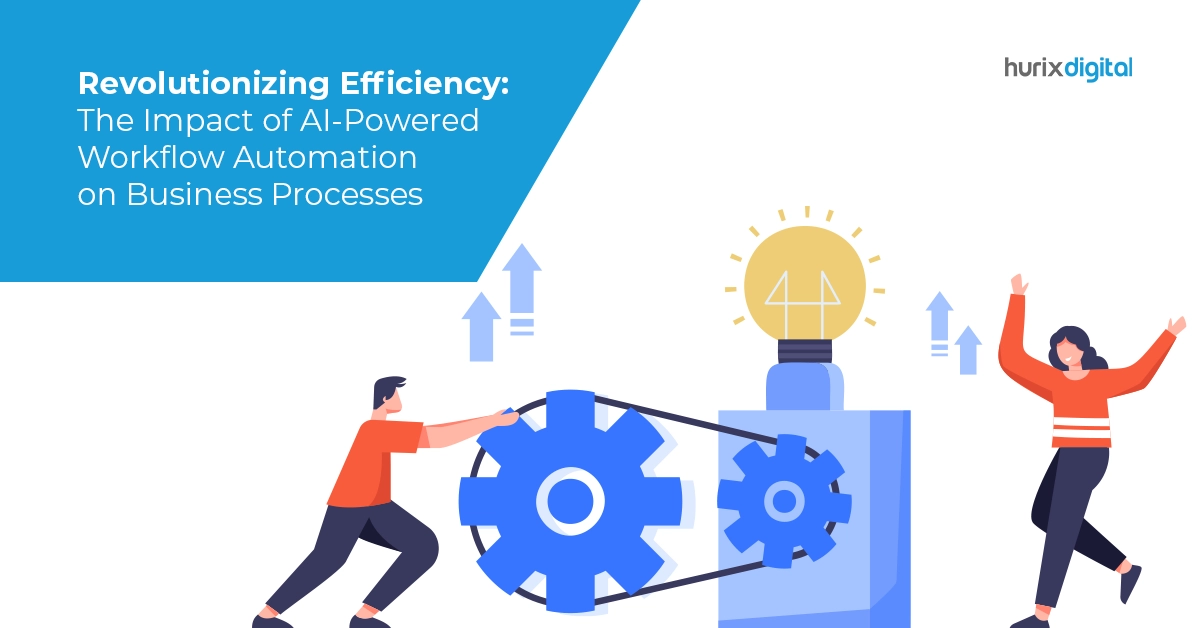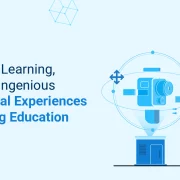
Revolutionizing Efficiency: The Impact of AI-Powered Workflow Automation on Business Processes
Summary
This blog provides an overview of AI powered workflow automation, why it matters for business processes, how it works, and some examples of how it is being used in different industries.
Workflow automation is the process of automating repetitive, manual, or rule-based tasks that are part of a business process. However, traditional workflow automation tools have some limitations, such as requiring human intervention, not handling complex or dynamic tasks, and not adapting to changing business needs. That’s where AI workflow automation comes in.
AI-powered workflow automation is the application of artificial intelligence (AI) technologies, such as machine learning, natural language processing, computer vision, and cognitive automation, to enhance or replace human involvement in workflow automation.
According to a study by PwC, artificial intelligence is expected to contribute up to $15.7 trillion to the global economy by 2030, more than China and India combined. Further, according to a report by Semrush, AI growth will increase by 33.2% annually between 2020 and 2027.
In this blog, we will explore what AI-powered workflow automation is, why it matters for business processes, how it works, and some examples of how it is being used in different industries. Let’s dive right in!
Table of Contents:
- What is AI-Powered Workflow Automation?
- Why AI-Powered Workflow Automation Matters for Business Processes?
- How AI-Powered Workflow Automation Works?
- How to Implement AI-Powered Workflow Automation in Your Business
- Conclusion
What is AI-Powered Workflow Automation?
AI workflow automation is the integration of AI technologies with workflow automation tools to automate tasks that require human intelligence, such as:
1. Data Analysis
With AI, you can extract meaningful insights, patterns, and trends from large amounts of structured and unstructured data, such as text, images, audio, and video. AI can also perform predictive analytics, allowing businesses to anticipate future outcomes and take proactive measures.
2. Content Creation
Based on data and context, AI can generate high-quality content, which can be tailored to the audience, tone, and style preferences, such as reports, articles, emails, and social media posts.
3. Decision Making
AI can evaluate multiple options and scenarios and recommend the best course of action based on the data and the goals. It can also explain the rationale behind the decisions and provide feedback and suggestions for improvement.
4. Customer Service
Using natural language, voice, or chat, AI can communicate with customers and provide them with relevant information, solutions, and suggestions. If necessary, AI can also escalate complex requests, complaints, or requests to human agents.
Why Does AI-Powered Workflow Automation Matter for Business Processes?
AI-powered workflow automation can have a significant impact on business processes by delivering the following benefits:
1. Efficiency
Automation of workflows with artificial intelligence can help businesses save time, money, and resources. By automating workflows with AI, human errors, delays, and bottlenecks can also be eliminated, improving the quality and speed of the work.
2. Productivity
Workflow automation tools can help businesses increase the output and value of the tasks and processes. They can also enable human workers to focus on more strategic, creative, or value-added tasks rather than mundane, routine, or low-value tasks.
3. Quality
With AI-powered workflow automation, companies can improve the accuracy, consistency, and reliability of their tasks and processes, as well as ensure compliance with standards, regulations, and best practices.
4. Innovation
By automating workflows and processes using AI, businesses can boost creativity, diversity, and flexibility. They can also explore new opportunities, explore new markets, and adapt to changing customer preferences, expectations, and needs.
Also Read: How Intelligent Automation (RPA+AI) will Revolutionize Business Processes?
How AI-Powered Workflow Automation Works?
AI-powered workflow automation is being used in various industries and domains, such as:
1. Healthcare
Healthcare providers can improve the quality and efficiency of patient care, diagnosis, treatment, and research with AI-powered workflow automation.
For example, cognitive automation can automate the tasks of scheduling appointments, checking eligibility, verifying insurance, processing claims, generating reports, analyzing medical images, recommending medications, and monitoring vital signs.
2. Education
AI-powered workflow automation can help educators enhance the effectiveness and accessibility of learning, teaching, and assessment. For example, educators can automate the tasks of creating personalized learning plans, generating adaptive content, providing feedback, grading assignments, detecting plagiarism, and recommending courses using these tools.
3. Finance
Automating workflows based on artificial intelligence can help financial institutions improve performance and security. Verifying identity, detecting fraud, assessing risk, approving loans, producing invoices, reconciling accounts, and providing financial advice can be automated with such a tool, for example.
4. Marketing
Marketing campaigns, content, and communication can be more effective and relevant when AI-powered workflow automation is used. A workflow automation tool powered by AI can automate tasks such as segmenting customers, generating leads, creating ads, writing emails, posting social media, and optimizing conversions.
5. Human Resources
It is possible to streamline and improve the hiring, training, and retention of employees using AI-powered workflow automation. For instance, HRs can use it to automate tasks such as screening resumes, conducting interviews, providing feedback, and creating learning paths.
How to Implement AI-Powered Workflow Automation in Your Business?
AI-powered workflow automation can offer many benefits for your business, but it also requires careful planning and execution. Here are some steps that you can follow to implement AI-powered workflow automation in your business:
1. Identify the Tasks and Processes That Can Be Automated
Start by analyzing your current tasks and processes, identifying the ones that are repetitive, manual, rule-based, complex, dynamic, or unstructured. Additionally, you can prioritize the tasks and processes based on their impact, feasibility, and urgency.
2. Choose the Right AI Technologies and Workflow Automation Tools
You can then select the AI technologies and workflow management software that best suit your needs, goals, and budget. Also, consider the compatibility, scalability, and security of the AI technologies and workflow automation tools that you choose.
3. Design and Test the Workflows
The next step will be to create workflows that define the steps, inputs, outputs, and actors involved in the tasks and processes. You can also test the workflows to ensure that they meet the quality, efficiency, and innovation standards that you have established.
4. Deploy and Monitor the Workflows
After you deploy the workflows into your production environment, you can monitor their performance, outcomes, and feedback, as well as optimize and improve the workflows based on your insights and data.
Also Read: Unlock Success for Your Business with AI Workflow Automation
Conclusion
AI-powered workflow automation is a powerful way to transform your business processes by enhancing efficiency, productivity, quality, and innovation. It can help you automate tasks that are beyond the scope of traditional workflow automation tools and that require human intelligence, such as data analysis, content creation, decision-making, and customer service.
If you are looking for a partner who can help you implement AI-powered workflow automation in your business, look no further than Hurix Digital. We are a leading provider of AI solutions and services that can help you leverage the power of AI to optimize your business processes and outcomes.
Get in touch with us for more details!

SVP & Head – Hurix Technology Solutions
Global Delivery head with 25 years of working experience in NYC investment banks and fintech companies. Hands-on technology delivery management and program management, accountable for stakeholder relationships, Strategic roadmap, P&L, Revenue growth, Account Management, and employee satisfaction.



